| Srl | Item |
| 1 |
ID:
155303
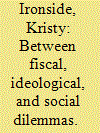

|
|
|
|
|
| Summary/Abstract |
This article examines the ‘tax on bachelors, singles, and small families of the USSR’. The tax was introduced in 1941 to boost the birth rate and expanded in 1944 to finance the state’s benefits offered to mothers and children. The Ministry of Finance eventually moved away from its support for the regressive and inefficient bachelor tax and explored other tax-based strategies to boost the birth rate and support families. However, it was constrained in its reform efforts, both by Khrushchev and by ideas about the appropriate role of taxes as the Soviet Union progressed away from crisis and towards communism.
|
|
|
|
|
|
|
|
|
|
|
|
|
|
|
|
| 2 |
ID:
178265
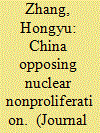

|
|
|
|
|
| Summary/Abstract |
Why did a would-be recognized nuclear state oppose nonproliferation for two decades, but then change its position in 1984? Based on extensive fieldwork in Beijing where the author conducted 20 interviews with high-profile Chinese government and military officials, ambassadors of disarmament, and nuclear and astronautic scientists, this article argues that China openly opposed nonproliferation to give its nascent nuclear program time to achieve a retaliatory capability. Once this goal was fulfilled in the mid-1980s, China began accepting nonproliferation norms. While China’s fervent opposition seemed ideological in a revolutionary era, it was indeed a rational behavior in pursuit of security interests.
|
|
|
|
|
|
|
|
|
|
|
|
|
|
|
|
| 3 |
ID:
089208
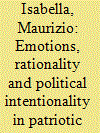

|
|
|
|
|
| Publication |
2009.
|
| Summary/Abstract |
The procedures by which Alberto Banti defines the Risorgimento as a construction founded in the main upon deep images linked to the emotive and symbolic sphere raise question of the utmost importance regarding the very nature of Italian nationalism.
|
|
|
|
|
|
|
|
|
|
|
|
|
|
|
|
| 4 |
ID:
085920
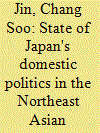

|
|
|
|
|
| Publication |
2008.
|
| Summary/Abstract |
This study considers how the post-war generation has expanded its influence in Japanese politics after the 90's.This generation has strongly desired to re-evaluate the LDP conservative main stream,Which was oriented around economic development and preferred peaceful diplomacy.
|
|
|
|
|
|
|
|
|
|
|
|
|
|
|
|
| 5 |
ID:
116870
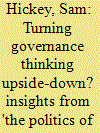

|
|
|
|
|
| Publication |
2012.
|
| Summary/Abstract |
Mainstream thinking within international development around what constitutes 'pro-poor' forms of politics is increasingly at odds with the growing evidence-base on the politics of development. Ideological bias towards Weberian modes of governance and rational actor models of political behaviour, and a growing belief in the power of 'evidence-based policy making' fail to reflect the extent to which informal and patronage-based forms can sometimes play a positive role in enabling poverty reduction, as well as the fact that political elites respond to a wider range of incentives than commonly assumed, including a role for political ideology and discourse rather than evidence per se. These findings offer further support for a fundamental rethinking around the role of politics in shaping development.
|
|
|
|
|
|
|
|
|
|
|
|
|
|
|
|
| 6 |
ID:
106869
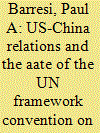

|
|
|
|
|
| Publication |
2011.
|
| Summary/Abstract |
The Kyoto Protocol to the United Nations Framework Convention on Climate Change (UNFCCC), which the People's Republic of China (PRC) has ratified but the United States has not, imposes legally binding greenhouse gas (GHG) emissions reduction requirements only on developed countries, and only through 2012. Like most less developed countries, the PRC has insisted that only developed countries should be required to limit their GHG emissions as a matter of international law under any successor to the Kyoto Protocol. American traditional conservatives repeatedly have cited the lack of legally binding international limits on the PRC's own emissions as a principal reason for not ratifying the Kyoto Protocol or binding the United States to any successor accord with similar terms. Many observers regard an accommodation between the United States and the PRC-the world's two largest GHG emitters by far-as essential to the success of efforts to limit global warming to acceptable levels under the UNFCCC. In the absence of a major breakthrough in the Conference of the Parties, which no one expects to happen anytime soon, the UNFCCC seems destined to become a mere footnote in the story of how we humans either succeeded or failed in our efforts to avert catastrophic global climate change, with both US-China relations and American traditional conservatism having played no small role in sealing its fate.
|
|
|
|
|
|
|
|
|
|
|
|
|
|
|
|